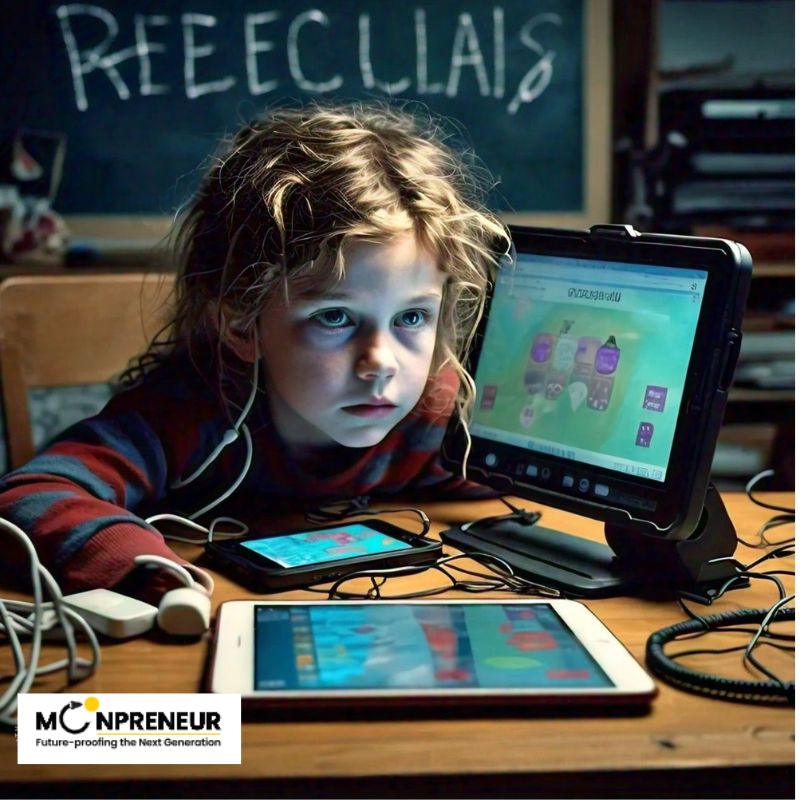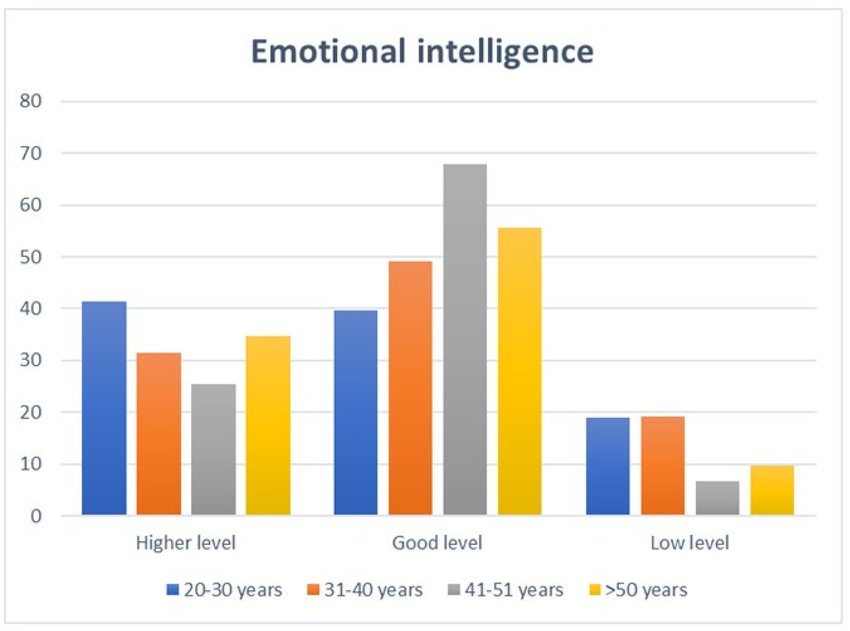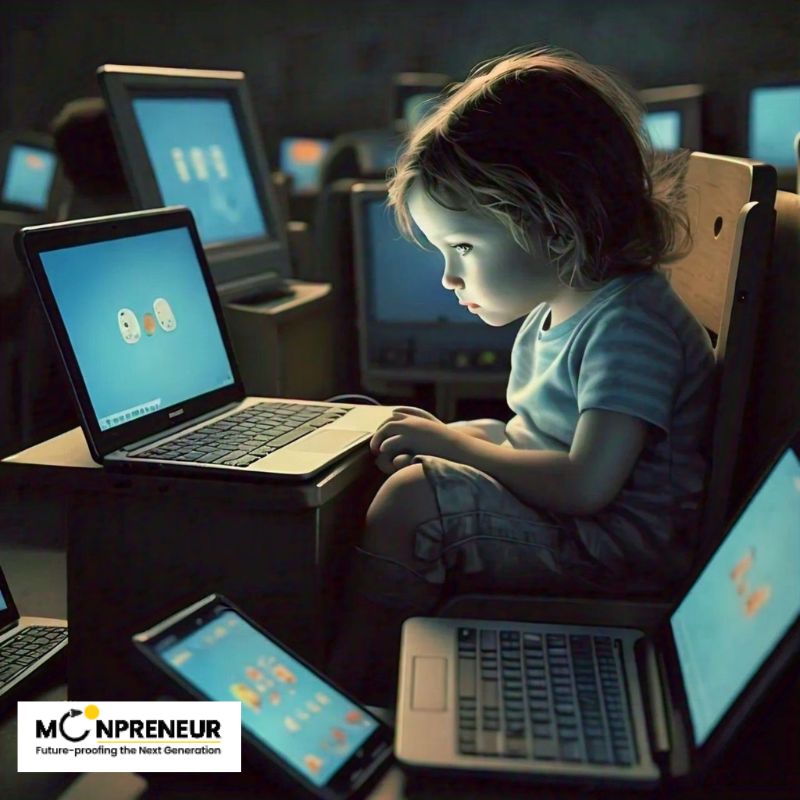The pervasive use of technology among children is significantly impacting their emotional intelligence. With the rise of smartphones, tablets, and constant online interactions, kids are spending less time engaging in face-to-face communication and more time in digital environments. This shift reduces opportunities for them to develop essential social skills, such as empathy, emotional regulation, and effective communication.
Instead of navigating real-life social situations, children are often isolated behind screens, which can hinder their ability to understand and manage their own emotions as well as those of others. Consequently, the overuse of technology can stifle the growth of emotional intelligence, which is crucial for building healthy relationships and achieving long-term personal success.

In today’s digital world, technology greatly influences our lives, including children’s emotional intelligence (EI). The chart shows emotional intelligence levels across age groups: 20-30 years (blue), 31-40 years (orange), 41-51 years (grey), and under 50 years (yellow). It reveals that younger adults generally have higher EI, while levels vary among older age groups. This data emphasizes how technology can impact emotional development and highlights the need to address its effects on children’s EI.

Image Source: Research Gate
The Shift in Social Interactions
Technology has transformed the way we communicate and interact with each other. Children, who once spent hours playing outside, engaging in face-to-face conversations, and developing social skills, are now spending more time on screens. Social media, online games, and messaging apps have replaced many traditional forms of interaction. This shift can lead to a decline in the development of key emotional intelligence skills such as empathy, self-awareness, and social emotional learning.

Pro Tip
|

Reduced Empathy and Social Skills
Empathy, the ability to understand and share the feelings of others, is a crucial component of emotional intelligence. Face-to-face interactions, where children can observe body language, facial expressions, and tone of voice, are essential for developing empathy. However, digital communication often lacks these non-verbal cues, making it harder for children to practice and hone their empathetic and social skills.
Moreover, children who spend a lot of time on mobile phones may miss out on important social experiences that teach them how to navigate real-world social situations. They might struggle with interpreting emotions and responding appropriately in social contexts, leading to a decrease in their social competence.
The Impact of Screen Time on Emotional Regulation
Emotional regulation, or the ability to manage and respond to one’s emotions in a healthy way, is another critical aspect of emotional intelligence. Excessive screen time, particularly when it involves consuming highly stimulating or emotionally charged content, can make it difficult for children to regulate their emotions. They may become more prone to mood swings, irritability, and difficulty calming down after engaging with technology.
Furthermore, the instant gratification that technology often provides can lead to impatience and a lack of perseverance. Children may struggle with delayed gratification, which is an important skill for emotional regulation and overall emotional intelligence.


Decreased Face-to-Face Communication
The convenience of digital communication can sometimes replace meaningful face-to-face interactions. While texting and video calls can keep people connected, they don’t provide the same depth of connection as in-person conversations. Children who rely heavily on open communication may find it challenging to develop strong interpersonal relationships and may feel isolated despite being constantly connected online.
Practicing Emotion Coaching to Counteract the Effects of Technology
Parents and educators play a crucial role in mitigating the negative impacts of technology on children’s emotional intelligence. One effective method is practicing emotion coaching. This approach involves guiding children through their emotions and teaching them how to understand and manage their feelings.
By embracing the power of positive parenting, adults can foster a supportive environment where children learn to navigate their emotions healthily. This proactive involvement helps counterbalance the effects of excessive screen time, ensuring that kids develop the emotional intelligence necessary for building strong relationships and achieving success in various aspects of life.

Steps parents should follow to help regulate their children’s emotions
Step 1: Be Aware of Your Child’s Emotions
Emotion coaching begins with being aware of your child’s emotions. This means recognizing both your own feelings and those of your child. By being sensitive to your child’s emotional state, you can respond appropriately without requiring them to exaggerate their emotions for recognition.
Step 2: See Emotions as an Opportunity for Connection and Teaching
Children’s emotions should be viewed as an opportunity to connect and teach, rather than an inconvenience. When a child expresses emotions, it’s a chance to bond and guide them through understanding and managing their feelings.
Step 3: Listen and Validate Feelings
Active listening is key. Give your child your full attention and validate their feelings by reflecting back what you hear. This shows your child that their emotions are understood and taken seriously.
Step 4: Label Their Emotions
Help your child develop an awareness of their emotions by labeling them. Providing a vocabulary for their feelings aids in emotional literacy, making it easier for them to communicate their emotions effectively.
Step 5: Help Your Child Problem-Solve with Limits
While all emotions are acceptable, not all behaviors are. Guide your child in coping with their emotions by teaching problem-solving skills and setting behavioral limits. This involves setting goals and brainstorming solutions together to manage their feelings appropriately.
Conclusion
While technology offers many advantages, it’s important to be mindful of its potential impact on children’s emotional intelligence. By balancing screen time with real-world interactions and emotional learning opportunities, and by practicing emotion coaching, we can help children develop the skills they need to thrive emotionally and socially in an increasingly digital world.
Looking for a comprehensive parenting guide to ensure you are on the right track? Explore a wealth of parenting wisdom and educational insights in Moonpreneur’s blogs. Additionally, you can join our programs that nurture the next generation of innovators. Book a free trial now!
















